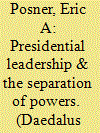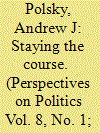| Srl | Item |
| 1 |
ID:
146247


|
|
|
|
|
| Summary/Abstract |
The presidents who routinely are judged the greatest leaders are also the most heavily criticized by legal scholars. The reason is that the greatest presidents succeeded by overcoming the barriers erected by Madison's system of separation of powers, but the legal mind sees such actions as breaches of constitutional norms that presidents are supposed to uphold. With the erosion of Madisonian checks and balances, what stops presidents from abusing their powers? The answer lies in the complex nature of presidential leadership. The president is simultaneously leader of the country, a party, and the executive branch. The conflicts between these leadership roles put heavy constraints on his power.
|
|
|
|
|
|
|
|
|
|
|
|
|
|
|
|
| 2 |
ID:
096285


|
|
|
|
|
| Publication |
2010.
|
| Summary/Abstract |
Military stalemate in Iraq and Vietnam presents a puzzle: why do presidents persist in a strategic course that has failed to secure the goals they defined when they chose to embark upon war? In the face of a quagmire, presidents might choose among three broad strategic options-disengagement, escalation, or continuity. I argue that the first alternative, to withdraw, is made impossible by the inflated rhetoric presidents invoke to sell a skeptical public on the necessity for a limited war and by their own conviction (reinforced by core supporters) that the price of defeat is too great. At the opposite pole lies the possibility of full-scale mobilization. But because presidents during the Vietnam and Iraq wars believed they could also pursue expensive domestic agendas, they did not reserve the resources needed for large-scale escalation. In the both cases, too, civilian leaders were deeply skeptical about their military counterparts and discounted their caution that a greater military commitment would be needed. Finally, as wars drag on, public disenchantment prevents presidents from mustering the political support escalation would require. Their early decisions thus leave them with no alternative to their current strategic commitment.
|
|
|
|
|
|
|
|
|
|
|
|
|
|
|
|